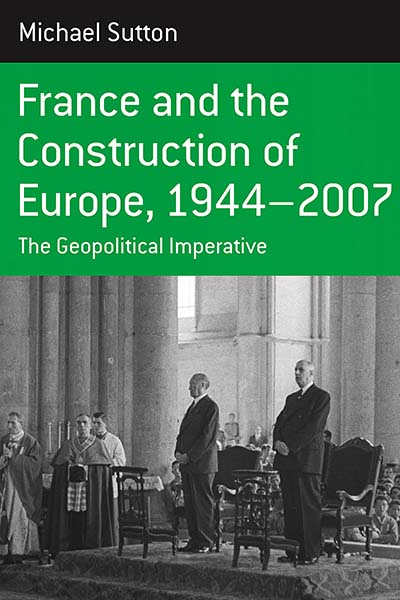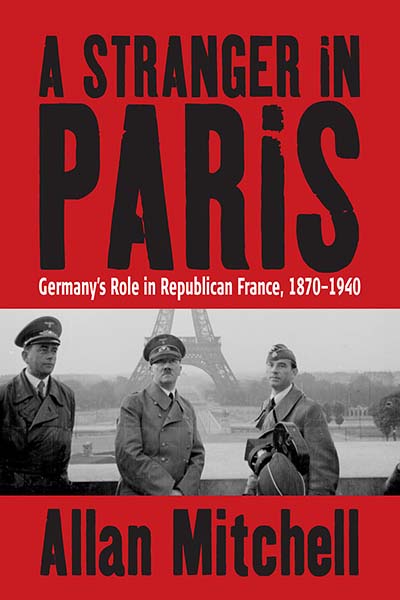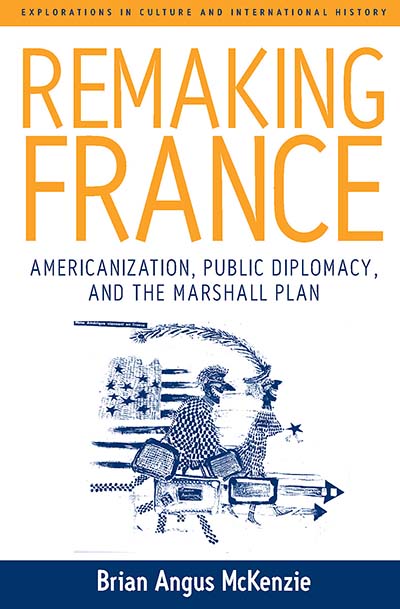
Series
Volume 7
Berghahn Monographs in French Studies
See Related
History JournalsEmail Newsletters
Sign up for our email newsletters to get customized updates on new Berghahn publications.
France and the Construction of Europe, 1944-2007
The Geopolitical Imperative
Michael Sutton
366 pages, bibliog., index
ISBN 978-1-84545-393-0 $150.00/£115.00 / Hb / Published (December 2007)
ISBN 978-0-85745-290-0 $39.95/£31.95 / Pb / Published (March 2011)
eISBN 978-0-85745-292-4 eBook
Reviews
“Combining a rich array of secondary sources with a solid assortment of published primary sources such as memoirs and official papers, Sutton presents a highly detailed, interpretive account that represents a valuable contribution to our understanding of contemporary European history.” • The Historian
“Michael Sutton’s admirable book is a very comprehensive and very well researched history of France’s European policy since 1944, including economic aspects. Going actually beyond its title, this volume covers most major aspects of French foreign policy, in a precise as well as readable way. This makes the book useful for students, but also for professional historians and the general public.” • Journal of Contemporary History
“Michael Sutton has produced an eminently readable and strongly researched overall history of France’s tireless efforts in favor of ‘la construction européenne’… The book is a veritable tour de force and will long be cited as a primary reference on France’s tortuous relations with Europe.” •French Politics, Culture & Society
“This fine survey of France’s role in European integration since World War II… covers the most significant negotiations on European integration from early postwar plans for regional customs unions to the abortive European Constitution. Students of France’s role in European politics will find it useful for several reasons… Sutton has succeeded admirably in making his case and presenting an exceptionally lucid account of several decades of complicated political and economic manouevre.” • H-Diplo
“The book is highly impressive in its range, integrating such issues as the impact of the Cuban missile crisis into its account of Franco-American relations and the implications for France's position in Europe. It is also impressive in its command of intricate detail in the technical, economic sphere and in high-level negotiations, as well as in behind-the-scenes maneuvers taking place in parallel to more overt diplomacy.” • French Studies
“Sutton's important work has the merit of making known a whole range of French historiography that, because of not being available in English translation, is not accessible to scholars who do not read French. At the same time, he brings together, in an original manner, the main results of historical research on the role of France in Europe, a theme that is of vital importance still today.” • Modern & Contemporary France
“[The author] has written an excellent chronicle of the central episodes of European construction, from the invention of the ECSC to the Maastricht Treaty and beyond, keeping French initiatives, breakthroughs, and missteps clearly in view. He has also made the more recondite economic complexities of the story intelligible to general readers. As a result, Sutton has produced an important overview of European integration that highlights the influence French leaders exerted in building what by the 1990s had become the fundamental structures of the European Union we know today.” • H-France
“Sutton has a feel both for the ongoing manoeuvres of the main protagonists and for the continuities of the broad picture. He keeps the context constantly in geopolitical focus, drawing upon a wide range of reliable secondary sources. [His] scrupulous study will allow both protagonists and antagonists to recognize why the European show is still on the road, but now arouses fears rather than hopes.” • European History Quarterly
Description
In the second half of the twentieth century France played the greatest role - even greater than Germany’s - in shaping what eventually became the European Union. By the early twenty-first century, however, in a hugely transformed Europe, this era had patently come to an end. This comprehensive history shows how France coupled the pursuit of power and the furtherance of European integration over a sixty-year period, from the close of the Second World War to the hesitation caused by the French electorate’s referendum rejection of the European Union’s constitutional treaty in 2005.
Michael Sutton is Professor Emeritus, Modern History and International Relations, at Aston University. He has written regularly on France for The Economist Intelligence Unit - part of The Economist newspaper group - since 1985, and worked in Brussels from 1973 to 1993 monitoring European Community developments. He is also a specialist in twentieth-century French political thought and philosophy.




